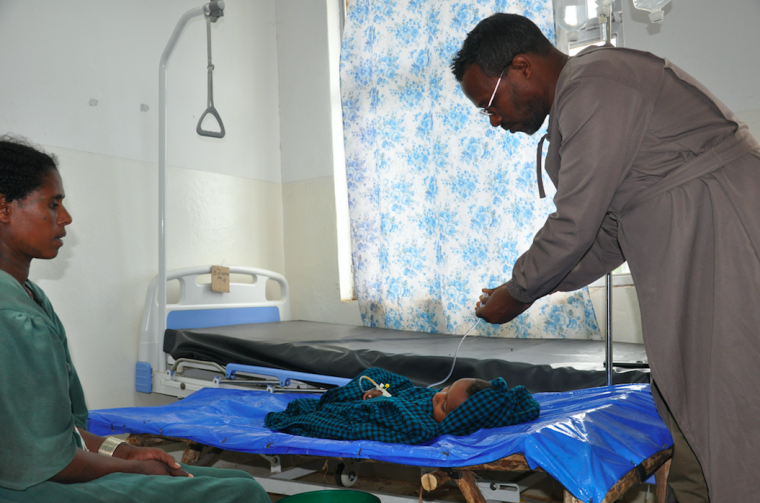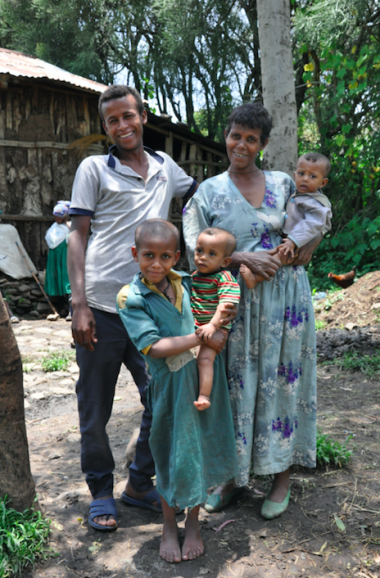Helping the children suffering this terrible, preventable disease tightening its grip on Ethiopia

I can't help but think about my own children as I enter the treatment centre.
The last time my seven-year-old son Eyasu was ill with diarrhea we rushed him to the hospital, clung to his side and searched for a medic to take action. He needed help. We needed him to be free of pain. We needed him to survive.
As the doctors and nurses took over, I carefully watched my son's movements. As he started to recover, I took sharp mental notes of the list of medication he required. I was desperate for Eyasu to return to being the boy who loves laughing while watching Tom and Jerry.
Some 730 kilometers from our home in Ethiopia's capital, Addis Ababa, this scene is far too common. The sounds of children groaning as they languished in diarrhea and vomit greeted me last week when I stepped into the acute watery diarrhea (AWD) treatment centre in Dembia.
This area is one of the districts hardest hit by an AWD outbreak that has so far affected more than 110,000 Ethiopians and Somalis this year. The disease has killed more than 1,600 people across the two countries.
A parent's nightmare
At Kola Diba hospital in Dembia, parents are rushing their children to the treatment centre, writhing in pain.
Tangut Melke carried her youngest daughter to the hospital in desperation. Hours after three-year-old Bizunesh drank contaminated water, she began continually vomiting and having repeated bouts of diarrhea. When Bizunesh was brought to the hospital, she was so weak she could barely lift her head. For five dreadful days and nights, Bizunesh floundered in between life and death, unable to speak, and hardly able to move.
For Tangut, the situation was a nightmare. She sat at the bedside, gazing at the youngest of her four children, willing Bizunesh to live.
'I spent the days and nights hoping my little girl would recover. I needed to see her playing with her siblings and friends like before,' Tangut says.
In other cases, it's parents themselves who are becoming ill, and who worry about the children they leave while seeking medical treatment.s
Abeba Achenef is the mother of one-year-old twins who are still being breastfed. When she was struck by sudden non-stop vomiting and diarrhea, Abeba was forced to seek treatment at Kola Diba Hospital. 'I thought I was going to die if I didn't go to the hospital,' Abeba says. 'It was very difficult for me to leave the twins behind at home.'

Hope for the future
My expert colleagues at World Vision explain that the outbreak of AWD is not only the result of drinking contaminated water, but also from unsafe handling and storage of drinking water.
The ongoing drought makes the situation worse. The 8.5 million people in Ethiopia who do not have enough food or water are at increased risk of contracting illnesses. Without access to a diverse diet and regular meals, a person's body is less able to fight disease.
World Vision is responding to the hunger crisis and addressing the AWD crisis. We are giving medical supplies and equipment to hospitals, and training health staff. Our field staff are also teaching families about safe water handling and providing water purification tablets to communities affected by AWD.
The support is working.
Three-year-old Bizunesh is now in recovery. After a week in the hospital, she was able to return home.
Abeba is also getting better. 'Now I am back with my twins whom I love more than anything. My joy is beyond explanation, God intervened in my life,' she says.
Abeba is now making sure her family only drinks treated water and follows strict hygiene practices. They are much better prepared to fight off AWD and other diseases like it.
Still, as I see more children and their parents arrive at the treatment centre Dembia, I realise more needs to be done.
More life-saving medication is needed, and more knowledge must be shared to stop AWD and other diseases from emerging in the first place.
AWD is preventable. People who are informed about how to prevent the disease can escape its cruelty.
All children should reach their potential. No parent should have to worry that their child might die from a preventable disease.
Kebede Gizachew is a communication specialist focusing on emergencies at World Vision in Ethiopia. He is a father of two and lives in Addis Ababa. Find out more about World Vision's work in East Africa and how you can help, here. Follow @WorldVisionUK on Twitter and Instagram.











